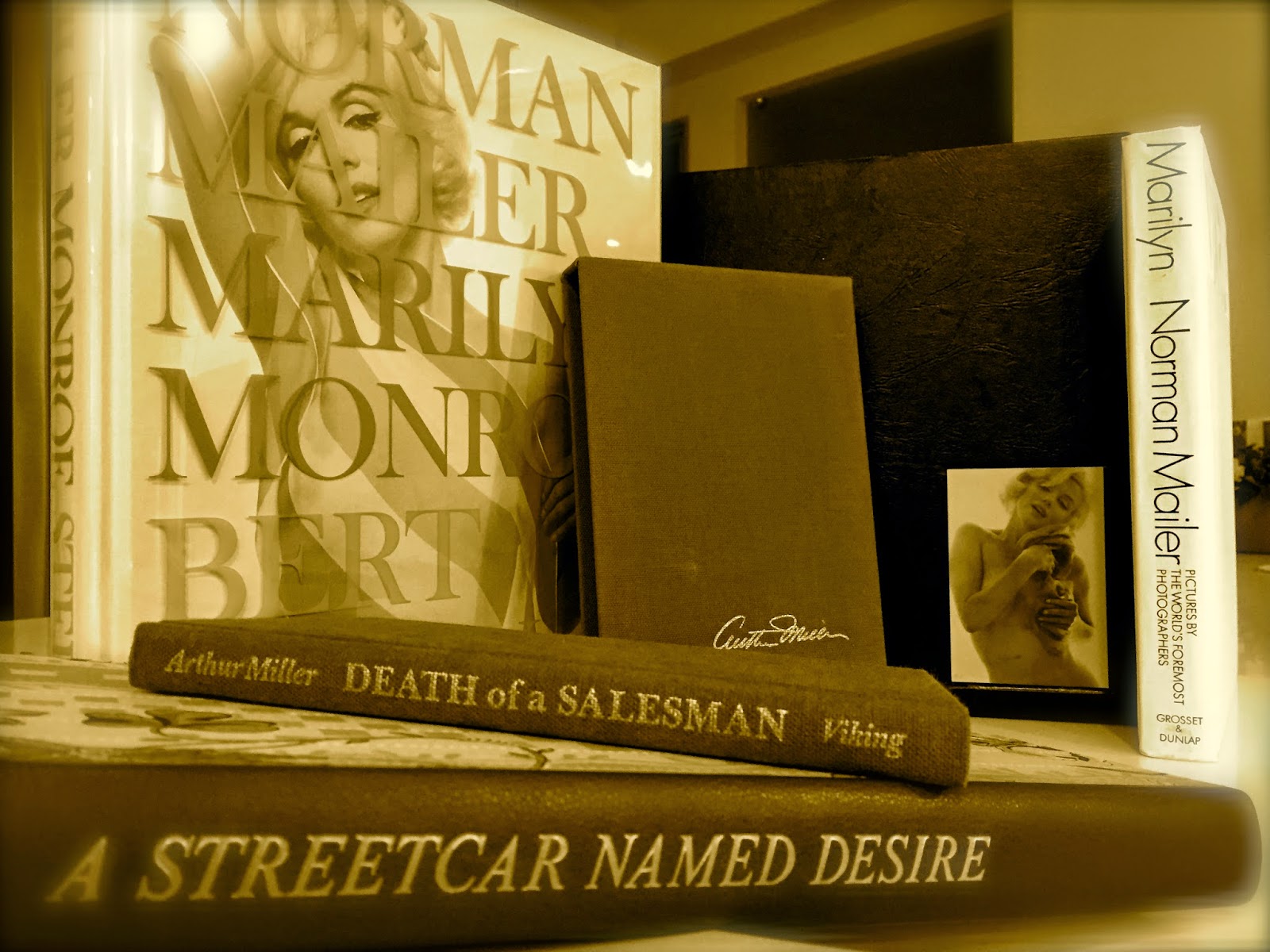Streetcar and Salesman, Desire and Despair, Machismo and Muliebrity
 |
| Williams' A Streetcar Named Desire by The Limited Editions Club, Miller's signed limited edition of Death of a Salesman, Mailer and Stern's Monroe by Taschen, and Mailer's signed limited edition of Marilyn |
This is a sequence of sort that follows from the tribute post to Holly Golightly and Breakfast at Tiffany's, as we pick things up with Mailer and Monroe while adding contextual associations to Arthur Miller and Tennessee Williams. Arthur Miller was Monroe's 3rd husband and a renowned playwright whose Death of a Salesman won the 1949 Pulitzer Prize for Drama. This play, with Williams' A Streetcar Named Desire and Eugene O'Neill's Long Days Journey Into Day, are the quintessential 20th century American plays. Streetcar and Long Days also won the same Pulitzer Prize in 1948 and 1956 respectively.
Streetcar and Salesman are grouped together here for thematic reasons. Both plays deal with desire and despair as well as machismo and muliebrity, and Monroe is as close to muliebrity as Mailer is to machismo. Mailer wrote a biography of Monroe that reads like creative nonfiction, a genre that is closely associated with Mailer, Capote, and Wolfe of The Bonfire of the Vanities fame. The book's speculative cause of Monroe's mysterious death was especially controversial, leading to Miller's rebuke that Mailer was "acting out his own Hollywood fantasies of fame and sex unlimited and power." Taschen's beautiful crafted book bestowed an eternal, if mysterious, beauty to the life of Marilyn Monroe through a deft juxtaposition of Mailer's prose with Stern's pictures It is interesting to imagine Monroe and Mailer reprising the roles of Blanche Du Bois and Stanley Kowalski respectively, maybe with Audrey Hepburn taking the role of Stella Kowalski, Blanche's younger sister and Stanley's wife, in an imagined cast for Streetcar.
In Streetcar, Blanche, a southern ex-teacher in destitute after losing her inheritance sought out refuge from her younger and pregnant sister, Stella, who was married to Stanley. For want of alternative, Blanche stayed on despite her appal at Stella's living condition. She was also disgusted by Stanley's uncouth and went on to have numerous altercations with him. Blanche did find temporary solace in Mitch, a friend and an antithesis of Stanley, but the romance ended when Stanley revealed what he learnt from a travelling salesman: that Blanche was mentally unstable and was rumored to be sexually improper. Stella subsequently went into labor and Blanche was alone at home, when she began to imagine a fictitious rich lover who would take her away. One night, when Stanley returned home from the hospital, they had an altercation that led to a rape. When Stella returned, Blanche told her what happened but was devastated by her sister's disbelief. After putting up a fight when the medical staff tried to take her to a mental facility, Blanche finally relented and uttered the now famous line: "Whoever you are, I have always depended on the kindness of strangers."
It seems that Blanche's muliebrity was no match of Stanley's machismo. Her dependency on the kindness of others ended badly. Her need for trust through her sister was crushed, and ended in tatters, for Stella was too vested with Stanley and the new family, especially with the arrival of the new baby. Her desire for happiness with Mitch was misplaced, for a "proper" man like him could never accept her past. Ultimately, these contingent desires all ended in despair, and a very sad ending for Blanche. One might point to Blanche's tendency for mental delusion as contributory to her plight, but I'm not sure if we don't engage in momentary mental escapades from time to time just to get by life's vicissitudes. The desire to cling onto what we were used or want to be can be very powerful, whether it is youth, vitality, or responsibility, or the lack of. Here, one is reminded of Fitzgerald's lament that "life is essentially a cheat and its conditions are those of defeat; the redeeming things are not 'happiness and pleasure' but the deeper satisfactions that come out of struggle.", or of Andersen's Little Match Girl, whose delusions were driven by similar despair
To end on an unrelated note, bowling and poker were two recurrent activities in the play. I wonder if that's a reflection of the choice of social activities in the 50s.
 |
| Selected illustration: One of Stella's neighbors taking the air on the steps of the building where she stays. Note the fan she is holding. |
 |
| Selected illustration: Stanley Kowalski, an ex-Army engineer with a fiery temper, who likes booze, bowling, and poker. |
 |
| Selected illustration: The dainty Blanche, in one of her showy but cheap gowns. Behind the snobbery and propriety is an insecure lady fearing the loss of her beauty with age, and desiring the help of others. |
 |
| Selected illustration: The rape scene |




After reading your review, I am determined to read the book - A Streetcar Named Desire. Thanks for sharing this.
ReplyDelete